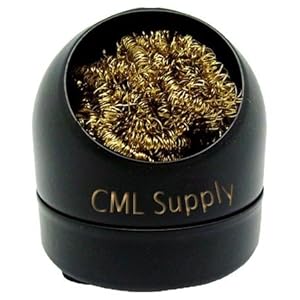Toxic Cables
Member of the Trade: Toxic Cables
- Joined
- Dec 17, 2011
- Posts
- 2,292
- Likes
- 142
Quote:
Can anyone tell me the length of Westone pins please?
Hi Luke,
It's 3.4mm on the stock cable.
Can anyone tell me the length of Westone pins please?
i ordered some transparent aftermarket ones from china that have not arrived yet. once they are in ill measure with a caliper.
...but which one of those? The Hakko one looks like a toy... lol.

Thanks. I used nylon sleeving and 26awg gold plated copper.
I use a Weller WES-51ND and have never had an issue with it.
I also use these butane irons for portable irons.
Also, pick up a a wire spnge for cleaning the tip. Wet sponges will do nothing other than ruin your soldering tips. The wire sponges are definitely worth the $10.

Just be careful that it doesn't flick hot solder as you drag the tip across it.
This is cool. I've never heard about why the wire sponge is better. Now that I think about it, I do have issues with some heat loss after wiping my iron. And you say it damages the tips too? Time to change.
They are great. You plunge the tip in and out, rather than wiping. This helps prevent spatter.
Also, pick up a a wire spnge for cleaning the tip. Wet sponges will do nothing other than ruin your soldering tips. The wire sponges are definitely worth the $10.
... A friend has told me to not bother with any kind of sponge, and flick the excess off against the wall instead. I don't think my landlord would approve of that.
I purchased the Hakko for $81.88, will be here Friday.
| tygamehk09 set 1 | tygamehk09 set 2 | Heir Audio 4.A cable | UE Super.Fi 3 | Westone ES 5 | |
| L front pin dia | 0.69mm | 0.68mm | 0.76mm | 0.74mm | 0.77mm |
| L rear pin dia | 0.69mm | 0.69mm | 0.77mm | 0.74mm | 0.77mm |
| R front pin dia | 0.69mm | 0.69mm | 0.77mm | 0.74mm | 0.77mm |
| R rear pin dia | 0.68mm | 0.69mm | 0.76mm | 0.74mm | 0.77mm |
| L front pin length | 3.02mm | 3.04mm | 3.32mm | n/a | n/a |
| L rear pin length | 3.02mm | 3.04mm | 3.32mm | n/a | n/a |
| R front pin length | 3.02mm | 3.05mm | 3.33mm | n/a | n/a |
| R rear pin length | 3.02mm | 3.05mm | 3.33mm | n/a | n/a |
| L gap between pins | 1.23mm | 1.25mm | n/a | 1.05mm | 1.04mm |
| R gap between pins | 1.21mm | 1.20mm | 0.97mm | 1.040mm | 1.08mm |

